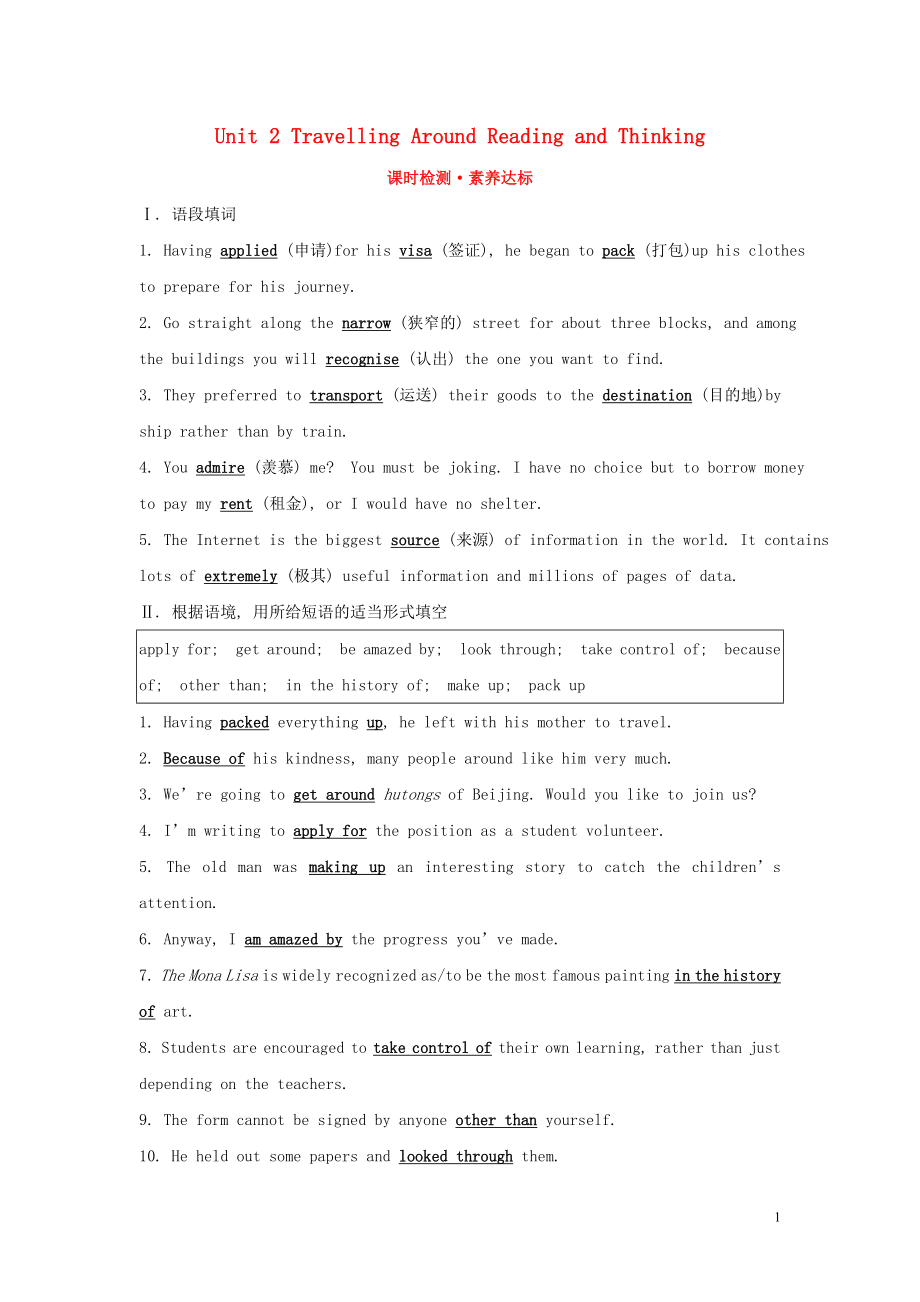《2020版新教材高中英語 Unit 2 Travelling Around Reading and Thinking課時檢測 素養(yǎng)達標(含解析)新人教版必修1》由會員分享���,可在線閱讀���,更多相關(guān)《2020版新教材高中英語 Unit 2 Travelling Around Reading and Thinking課時檢測 素養(yǎng)達標(含解析)新人教版必修1(4頁珍藏版)》請在裝配圖網(wǎng)上搜索。
1��、Unit 2 Travelling Around Reading and Thinking
課時檢測·素養(yǎng)達標
Ⅰ. 語段填詞
1. Having applied (申請)for his visa (簽證), he began to pack (打包)up his clothes to prepare for his journey.
2. Go straight along the narrow (狹窄的) street for about three blocks, and among the buildings you will recognise (認出) the one y
2���、ou want to find.
3. They preferred to transport (運送) their goods to the destination (目的地)by ship rather than by train.
4. You admire (羨慕) me? You must be joking. I have no choice but to borrow money to pay my rent (租金), or I would have no shelter.
5. The Internet is the biggest source (來源) of
3����、 information in the world. It contains lots of extremely (極其) useful information and millions of pages of data.
Ⅱ. 根據(jù)語境, 用所給短語的適當形式填空
apply for; get around; be amazed by; look through; take control of; because of; other than; in the history of; make up; pack up
1. Having packed everythi
4���、ng up, he left with his mother to travel.
2. Because of his kindness, many people around like him very much. ?
3. We’re going to get around hutongs of Beijing. Would you like to join us? ?
4. I’m writing to apply for the position as a student volunteer. ?
5. The old man was making up an interes
5���、ting story to catch the children’s attention. ?
6. Anyway, I am amazed by the progress you’ve made. ?
7. The Mona Lisa is widely recognized as/to be the most famous painting in the history of art. ?
8. Students are encouraged to take control of their own learning, rather than just depending on th
6、e teachers. ?
9. The form cannot be signed by anyone other than yourself. ?
10. He held out some papers and looked through them. ?
Ⅲ. 結(jié)合課文主題, 使用本單元詞匯與句型寫一篇50詞左右的短文
1. 五一節(jié), 我收拾了一些衣服去北京旅游了�����。(pack)
2. 一到北京, 我徑直去了頤和園, 它被認為是中國最大的保存最好的皇家公園���。(recognise)
3. 那兒的風景極其漂亮因此我不愿意離開��。(extremely, so that)
4. 然而,
7�、 天黑了, 我必須尋找住處�����。(accommodation)
__________________________________________________________________
__________________________________________________________________
__________________________________________________________________
【參考范文】
On May Day, I packed some clothes and travelled to Beijin
8�、g. On arriving in Beijing, I went directly to the Summer Palace, which is recognised as the largest and best-preserved royal park in China. The scenery there was extremely beautiful so that I was unwilling to leave. However, it was dark and I had to look for my accommodation.
完成句子
1. He injured h
9、is foot, so that he was unable to play in the match. ?
他傷著了腳, 因此不能打比賽了����。
2. It is the famous writer and his works that have aroused great interest among the students. ?
讓學生引起極大的興趣的正是這位著名作家以及他的作品。
3. Below is a description of a simple scientific experiment. ?
下面是對一個簡單科學實驗的描述��。
4. I am writing to
10���、apply for the job as a tourist guide in your company. ?
我寫信要申請貴公司的導游職位��。
5. Present at the meeting were Professor White, Professor Smith and many other guests. ?
出席會議的有懷特教授����、史密斯教授以及許多其他的客人。
The topic: Is it good travelling by train or by air?
by train
Advantages: It is less expensive and mos
11��、t of us can afford it.
Through the windows of the train, we can enjoy the scenery on the way.
It is safer to travel by train.
. . .
Disadvantages: The train is slow.
The train is crowded sometimes.
. . .
by air
Advantages: It can save much time.
It is more comfortable.
. . .
Disadvantag
12�����、es: The plane ticket is twice as expensive as a train ticket.
. . .
Your opinion: __________________________________________________
The reason: ?__________________________________________________
【參考答案】
We can’t say travelling by train is good or not. The same is true of travelling by air. If we just want to save money, we can travel by train. But if we want to save time, we can turn to the plane. ?
4
 2020版新教材高中英語 Unit 2 Travelling Around Reading and Thinking課時檢測 素養(yǎng)達標(含解析)新人教版必修1
2020版新教材高中英語 Unit 2 Travelling Around Reading and Thinking課時檢測 素養(yǎng)達標(含解析)新人教版必修1

